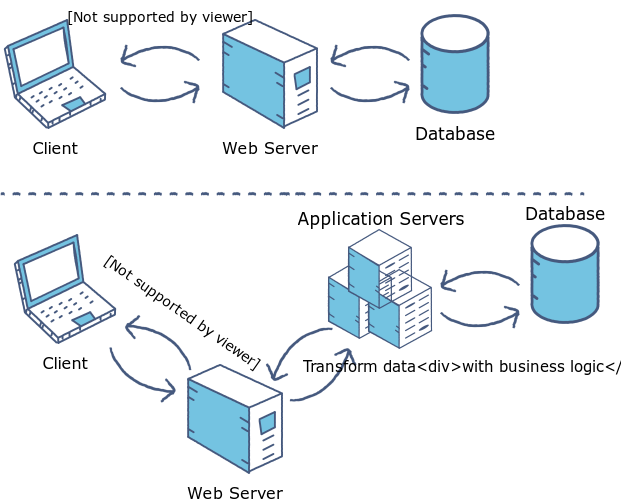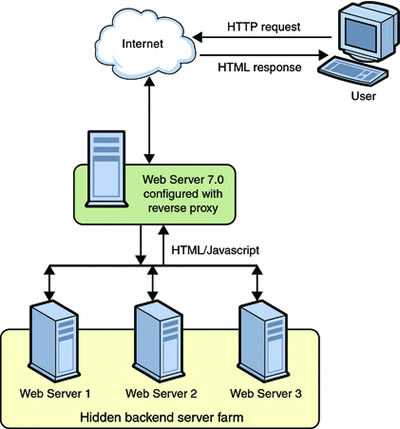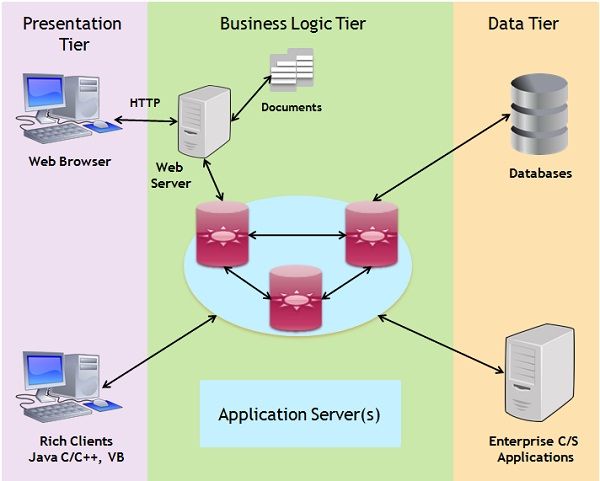Server and Web Server are two terms that are often confused and used interchangeably. But there is a difference between these two servers.
A server is a computer that provides services to other computers on the network. A server can be a physical machine or a virtual machine (VM). It could also be a service, such as an HTTP server or FTP server. The term server is also used loosely to mean software that implements the servers/services functionality (e.g., an Apache HTTP server or Microsoft SQL Server). A server does not serve by itself; it must be used in conjunction with some other application, such as an email client or web browser. This application may be running on another computer on the same LAN, or it could be running on the same computer but using some other networking protocol than TCP/IP to communicate with the server (e.g., AppleTalk).

Server And Web Server Difference
If we have a website open on the internet, then it is accessed by clients through a web server. A web server is an application that can be accessed via the internet and allows users to view HTML pages. Web servers are also known as HTTP servers.
Web servers are designed to serve only static content, they can’t execute code or store data. The main purpose of using a web server is to provide information to users who visit your site.
The most common type of web server is Apache Tomcat, which is used to create dynamic websites and applications, but there are several other types too like JBoss, GlassFish etc..
Application Server vs Database Server
An application server is different from a database server because it acts as a bridge between the two technologies. The application server stores data in memory or in files on its own hard drive but it doesn’t store them permanently like a database does. So if you want your application to work offline then you need a database server instead of an application server.
A web server is a computer system that processes HTTP requests and distributes them to serving applications, according to the resource location defined by each request. The term can also be applied to other systems, such as FTP servers, file servers, mail servers, database servers and more.
A web server’s primary function is to host websites. Web servers host the files that make up websites, including HTML pages and CSS files, images, JavaScript and other types of files. Web servers also interpret client-side scripts such as JavaScript or PHP that are designed to collect or display information from users.
A web server is responsible for processing all traffic coming into your website. It handles requests from users’ browsers (via HTTP), determines which file should be served in response to the request and sends it back to the browser. A web server works with application servers to process requests coming from browsers. For example, if a user visits a website by typing its URL into their browser’s address bar (e.g., www.example.com), then their browser sends a request for data (HTML page) to a web server via HTTP protocol over an Internet connection (e.g., broadband or dial-up).
Web server and application server are two important components of a modern web application. However, it is one of the most confusing concepts for beginners, who are new to building web applications.
Web Server
The Web Server is the computer that hosts your website. It is responsible for accepting requests from the user’s browser and returning them the proper HTML page.
Application Server
The Application Server is similar to a web server in that it serves requests to clients. But unlike a web server, it does not just return HTML pages but instead processes the requests and sends back responses, usually in the form of XML or JSON documents. An application server may also execute user code, such as Java servlets or PHP scripts, depending on its configuration (see below).
The server is a computer that provides services to clients. The clients can be human users or other programs. Server computers are often called host computers.
Web server: A web server is a software program on a computer that manages the files and resources available via the internet or a private network. Most websites are stored on web servers and are accessed using a web browser, but they can also be used to provide downloadable files, such as software updates or streaming media, to the general public over the internet. Web servers can also run other types of applications instead of serving just HTML pages and images.

Application server: An application server is a computer program that is designed to handle requests for specific applications from client devices (such as desktop PCs or mobile devices). There are many types of application servers, including some that specialize in specific types of functionality (such as e-commerce shopping carts), but most fall into one of two categories: J2EE servers or PHP servers. J2EE stands for Java 2 Platform Enterprise Edition; it was originally developed by Sun Microsystems, but has since become an open source standard maintained by Oracle Corporation. PHP stands for Hypertext Preprocessor; it is an open source scripting language
Web server vs Application Server
A web server is a computer or software program that can be used to serve content over the internet. The two most common web servers are Apache and Nginx. A web server can also be called a host or gateway.
The main job of a web server is to take requests from clients, such as browsers, and then return the appropriate responses. For example, if you enter http://google.com into your browser’s address bar and press Enter, your browser sends a request for that page to Google’s servers. Those servers then send back an HTML file containing the contents of google’s homepage which is displayed in your browser window.
Web server and Application server are two different types of servers.
A web server is a software that handles HTTP requests from browsers and serves them HTML files, images, CSS and JavaScript. Web servers are responsible for delivering static data to the clients. The web servers also manage dynamic content generated by other applications such as PHP or ASP.NET.
An application server is a software system that provides support for building, deploying and managing web applications. Application servers can be either standalone systems or components of larger systems such as Enterprise Resource Planning (ERP) systems.
Web server is a computer program that responds to HTTP requests by serving HTTP content. A web server can also be referred to as an HTTP server, since it serves the HTTP protocol, which is the most common protocol on the Internet.
An application server is a software system that provides a platform for developing and running applications, enterprise information systems or J2EE based applications in the form of software products or services. The application runs within an application server environment and generally uses a database management system (DBMS) as its back-end.[1] Examples include Java Enterprise System (JES), Weblogic Server, BEA WebLogic Server, IBM WebSphere Application Server and Oracle WebCenter Portal Server.[2]
Database Server
A database server is a computer program that provides services for managing database systems. It usually consists of one or more programs which interact with an end-user application (or “front-end”) via a network connection using some database access protocol.[3] Database servers may be general purpose (as their name suggests) or specialized for certain tasks.[4][5] In addition to providing storage and retrieval methods
Web server and application server are the two most important servers in a web application.
A web server is used to serve content to the browser, while an application server is used to process requests sent by the browser.
The web server will send all requests to the application server and wait for a response from it. The application server will process the request and send back a response back to the web server which then sends it back to the browser.
Typically, there are two types of web servers:
Static Web Server – this type of web server does not understand anything about dynamic content or scripts. Static content is served directly from disk without any processing whatsoever. A typical example of this is Apache HTTPD or Microsoft IIS, both of which are extremely popular.

Dynamic Web Server – This type of web server provides support for dynamically generated content and interactive applications such as PHP or ASP pages that can be executed on demand in order to produce output for serving up on the client’s browser screen.
Web server:
A web server is a software application that serves HTTP connections and is a server-side component of an Internet website or service. Web servers are generally deployed to host websites on the World Wide Web, using the Hypertext Transfer Protocol (HTTP) to serve the content to clients. Web servers may also be used to provide other services from their host computers, such as email, File Transfer Protocol (FTP), and instant messaging services.
Application server:
An application server is a computer system designed to support applications rather than end-users directly. It hosts one or more software applications in a manner that makes them available over a network. Application servers can either be general purpose or specialized. A general-purpose application server is designed for use by many different organizations, while a specialized application server might be designed for use by only one organization or business unit within an enterprise.
Database Server:
A database management system (DBMS) can be thought of as an operating system for databases, which provides services such as security and concurrency control between multiple users accessing the same data sets simultaneously. A DBMS allows users to access the data stored in databases through a query language called Structured Query Language (SQL).
Database Server
A Database Server stores information about your website’s users and contents in an efficient manner so that you don’t have to write any code for this purpose (it takes time!). You will need to write SQL queries against these databases to retrieve data for display on your website’s pages.
Server is a computer system that provides services to other computer systems. A server is typically a remote system accessible over a network, such as the Internet or a local area network. The client accesses the services provided by the remote server.
Web Server: A web server is a software application that responds to requests from web browsers and executes scripts on the user’s behalf.
Application Server: An application server is a software system that provides support for common functions needed by development teams. For example, an application server might provide security or user management functions or it might include preconfigured libraries of code that help developers write applications more quickly and easily.
Database Server: A database server stores and processes large amounts of data for retrieval by other programs, typically on behalf of clients (for example, web browsers).